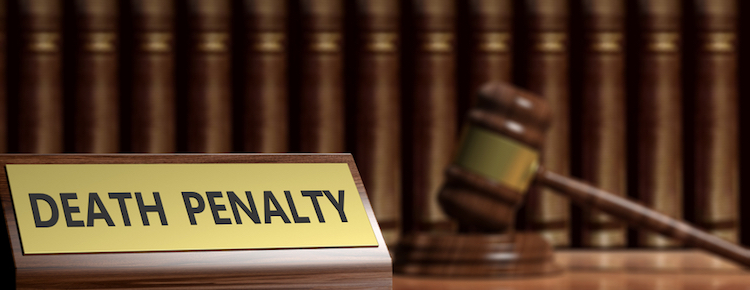SCOTUS stays execution, agrees to hear request for pastor's hands-on, out-loud prayer in death chamber

Image from Shutterstock.
The U.S. Supreme Court on Wednesday evening agreed to consider a Texas inmate’s request to have a Baptist pastor lay hands on him and pray out loud during his execution.
The high court stayed the execution of John Henry Ramirez and granted cert in his case, report the New York Times, the Washington Post and SCOTUSblog. The court directed that the case be set for argument in October or November.
Ramirez argues that refusing to allow the hands-on audible prayer violated his rights under the free exercise clause and the Religious Land Use and Institutionalized Persons Act. A federal judge rejected his petition earlier this month, holding that allowing a pastor to stand silently in the execution chamber accommodated Ramirez’s religious needs. The 5th U.S. Circuit Court of Appeals at New Orleans affirmed.
Ramirez was convicted for killing a convenience store clerk in 2004 during a string of robberies. The case is Ramirez v. Collier; the SCOTUSblog case page is here.
The Supreme Court has ruled on requests for execution stays by several inmates who wanted spiritual advisers at execution. The “shadow docket” cases are:
• In February 2019, the Supreme Court refused to block the execution of Alabama inmate Domineque Ray, who wanted an imam to be present during his lethal injection. Alabama denied Ray’s request, even though it allowed Christian clergy members at execution. The Supreme Court said in a brief order Ray had waited too long to seek relief. The case was Dunn v. Ray.
• In March 2019, the Supreme Court blocked the execution of Texas inmate Patrick Henry Murphy, who wasn’t allowed to have a Buddhist spiritual adviser with him as he was put to death. In an opinion concurring in the execution stay, Justice Brett M. Kavanaugh said he thought the Constitution bars denominational discrimination. Going forward, he said, the state could choose to let all inmates have a religious adviser of their faith into the execution room, or it could relegate all religious advisers to the viewing room. The case was Murphy v. Collier.
• In June 2020, the Supreme Court stayed the execution of Catholic inmate Ruben Gutierrez, who sought a chaplain in the death chamber in Texas. After Kavanaugh’s opinion in Murphy’s case, the state banned all clergy in the execution chamber. The Supreme Court said that, on remand, the lower court should determine whether allowing clergy in the death chamber would create serious security problems. The case was Gutierrez v. Collier.
• In February, the Supreme Court refused to allow Alabama to execute inmate Willie B. Smith III if he is not allowed to have a pastor with him in the execution chamber. The case was Dunn v. Smith.
See also:
ABAJournal.com: “Chemerinsky: In death do they part—SCOTUS justices show divisions over capital cases”
Write a letter to the editor, share a story tip or update, or report an error.


